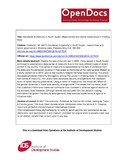Gendered (In)Security in South Sudan: Masculinities and Hybrid Governance in Imatong State
| dc.contributor.author | Oosterom, Marjoke | |
| dc.coverage.spatial | South Sudan | en |
| dc.date.accessioned | 2018-07-16T15:36:37Z | |
| dc.date.available | 2018-07-16T15:36:37Z | |
| dc.date.issued | 2017-02-28 | |
| dc.identifier.citation | Oosterom, M. (2017) Gendered (in)security in South Sudan: masculinities and hybrid governance in Imatong state, Peacebuilding 5.2: 186-202 | en |
| dc.identifier.uri | https://opendocs.ids.ac.uk/opendocs/handle/20.500.12413/13906 | |
| dc.description.abstract | Despite the end of the civil war in 2005, many people in South Sudan continued to experience a deep sense of insecurity due to the many different types of violent conflict in the country. This sense of insecurity is exacerbated by the lack of protection from the state and the perceived injustice in how power is distributed at the national level. Based on a study carried out in 2013, prior to the country’s relapse into large-scale violence, this article discusses gendered insecurity and agency among the Latuko in Imatong state. In response to their sense of insecurity, the Latuko have developed security arrangements that represent forms of hybrid security governance. Using a notion of masculinity, the article will reflect on the gender dynamics in these local security arrangements. This shows that the social order that customary institutions create can contribute to an increase in violence against women at the domestic level. However, although women are excluded from the decision-making institutions that govern the security arrangements, they exercise subtle forms of agency to influence them. | en |
| dc.language.iso | en | en |
| dc.publisher | Taylor & Francis Group | en |
| dc.rights | © 2017 The author(s). Published by Informa UK limited, trading as Taylor & Francis group. This is an Open Access article distributed under the terms of th Creative Commons attribution-noncommercial-noderivatives license (http://creativecommons.org/licenses/by-nc-nd/4.0/), which permits non-commercial re-use, distribution, and reproduction in any medium, provided the original work is properly cited, and is not altered, transformed, or built upon in any way. | en |
| dc.rights.uri | http://creativecommons.org/licenses/by-nc-nd/4.0/ | en |
| dc.subject | Security and Conflict | en |
| dc.title | Gendered (In)Security in South Sudan: Masculinities and Hybrid Governance in Imatong State | en |
| dc.type | Article | en |
| dc.rights.holder | Marjoke Oosterom | en |
| dc.identifier.externaluri | https://www.tandfonline.com/doi/full/10.1080/21647259.2016.1277015 | en |
| dc.identifier.team | Conflict | en |
| dc.identifier.doi | 10.1080/21647259.2016.1277015 | |
| dcterms.dateAccepted | 2017-02-13 | |
| rioxxterms.funder | Default funder | en |
| rioxxterms.identifier.project | Default project | en |
| rioxxterms.version | AM | en |
| rioxxterms.versionofrecord | http://dx.doi.org/10.1080/21647259.2016.1277015 | en |
| rioxxterms.funder.project | 9ce4e4dc-26e9-4d78-96e9-15e4dcac0642 | en |
Files in this item
This item appears in the following Collection(s)
Except where otherwise noted, this item's license is described as © 2017 The author(s). Published by Informa UK limited, trading as Taylor & Francis group. This is an Open Access article distributed under the terms of th Creative Commons attribution-noncommercial-noderivatives license (http://creativecommons.org/licenses/by-nc-nd/4.0/), which permits non-commercial re-use, distribution, and reproduction in any medium, provided the original work is properly cited, and is not altered, transformed, or built upon in any way.


